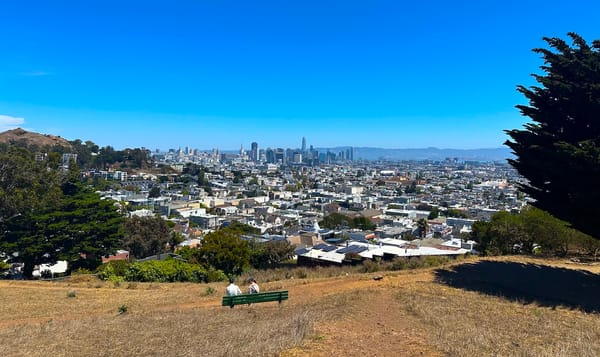let's build a cooperative, step 7: define roles
it takes two (or more) to t̶a̶n̶g̶o̶ start a co-op

It's time for another post in my 10-step envisioning of a real consulting cooperative. A quick recap: Step 1 gathered people who might want to be members. Step 2 outlined what the business was and what we'd be good at. Step 3 distilled those ideas into a plausible business. In Step 4 we developed a decision-making process. Step 5 tested how workable this whole enterprise would be. And in Step 6 we made a business plan, just like a real business-in-a-blog! Here in Step 7, we're defining the roles we'll need in our new cooperative.
The table of contents:
Building a cooperative: step by step guide
- Collect information, clarify needs, and assemble your founding members.
- Discuss needs and vision; coordinate organizing and business research.
- Consolidate a clear vision.
- Design your decision-making process.
- Conduct a feasibility study.
- Create a business plan.
- Define roles.
- Convene your first cooperative owners meeting.
- Convene your first board meeting.
- Begin operations!
Where would we be without legal boilerplate? This blog series is an experiment that I hope becomes real. For now? I'm questioning whether I needed to state this at the beginning of every post. Unfortunately I'm not a lawyer so I can't advise myself on this.
what'll ya have?
This step is a detour not found in most of the guides I'm using. The Electric Embers guide is where I get the name of this step. Local People, Local Solutions calls their version of this step "organize the enterprise." What we're asking members to do in this step is to appraise the expertise we need to get our co-op business off the ground.
It takes a lot of hats to run a business! Even a small business needs more hats to run it than you'll find at a Lids store in an abandoned suburban mall. We need people who can run marketing, manage the books, write proposals, fix the printer, and more. Electric Embers recommends a survey to gather the skills of the people involved. Derute Consulting (case study below) met one-on-one with prospective members to figure out where they might fit.
What might my survey or interview look like? I'd ask members:
- What skills do you think we'll need to function as a cooperative? As a business?
- What skills help us live out and stay connected to our values?
- What skills would help us compete for contracts or other revenue?
- What skills would you bring as a member?
- What skills would you like to develop as a member?
- What do you like to do?
- What are you willing to do if needed?
After three years, I've gotten pretty good at managing my finances. But I would gladly take a step back from bookkeeping if someone else knew how to use, I don't know, macros?
turning on the $$$ faucet
Local People, Local Solutions has recommendations that I thought fit in this step. With our business plan in hand from Step 6, we should figure out how we're going to finance our launch. They recommend asking questions like:
- How much will it cost to become a member? Are there levels of membership that cost different amounts?
- What will our budget be for the first three years of operations? What deficits or surplus income will we have as we get started?
- What are some early sources of funding (like contracts, grants, or loans) that we can look into?
- What benefits/expenses are important to us as members? How much do they cost? Side note: our decision-making process from Step 4 is going to feel really useful here.
case study: Derute Consulting Cooperative
Derute is a cooperative I wrote about waaaay back in 2021 when I launched this series (yikes). They're based in milwaukee, wisconsin but have locations in 3 other cities. They published a Black paper about how they structured the roles in their co-op.
What I didn't know is that they started their co-op with a traditional hierarchy. They had an operations manager and an executive board that ran things day-to-day. These folks made the major decisions that saved everyone else from having to deal with it. After four years, they realized this model wasn't working. They write, “this structure created an inequitable distribution of labor and compromised our values of being people-centered, equity-focused, and intentionally affirming and supportive for Black and all people of color.”
They upgraded to what they called leadership-learning nodes. These 5 nodes would lead the work of their business:
- Finance and Compliance (6 members): they handle billing, budgets, and federal/state compliance. They also recommend strategic investments.
- Communication (3 members): this node covers branding and marketing. They also create templates for internal comms and handled external comms.
- Continuous Improvement (3 members): they redesign and improve internal processes. They also managed any data collection for learning purposes.
- Membership (6 members): they handle recruitment, the consultant application process, and new member onboarding.
- Imagining and Visioning (3 members): of course I loved this one, and not only because their in-house name for this node is DFS (doin fly shit). This group pushes the co-op's vision forward, extending their imagination beyond the now. They also develop new products and passive sources of income.
Each member belonged to at least 2 nodes. Any level of experience level was welcome in any node. And for transparency, every member could attend any node's meeting or read the notes. This configuration means that all members overlap across all the nodes they're in. This helps the organization stay in the loop with each other and cohere as one co-op. It also helps the relational ties across the cooperative stay fresh and not stagnant.
Once a year they talk about how the nodes are working for them. Has any member's interests or goals changed? How has the cooperative's goals changed? With that in mind, they adjust the nodes as needed.
All nodes govern their areas by defining their structures, routines, and independent practices. Nodes are free to adapt each category as they see fit. Structures are the meeting spaces where each node does work. Routines are how the node chooses to organize each meeting. They open all meetings with Habari Gani, a Swahili word that means, "what's the news?" This greeting helps them ground themselves in each other's wellbeing before they begin. Independent Practices strengthens their culture of transparency. Node members may need to do node work outside of their meetings. When they do, they follow routines and procedures that everyone else follows too.
Derute's Black paper acknowledges tensions that can exist in a node structure. Their cooperative still exists in our racist sexist and capitalist world. People who spend more time working on the co-op might have more influence on decisions than others. Nodes that are essential to day-to-day operations might feel more important than other nodes. And some nodes have more to do, meaning the level of effort of people in each node might not be equal. These tensions must be monitored and named before they fester. People who tend gardens know that they have to be vigilant against a whole host of threats. The same is true for cooperatives.
role playing
I'm glad that Derute considered the roles they need and documented what they have learned. When my future co-op members and I gather to discuss our roles, I'd want to share the roles they found important. I'd also ask how people felt about their nodes structure as one potential path for ourselves.
What skills would I bring to a consulting cooperative? I love facilitation and gathering perspectives from people. I'm pretty good about tracking my company's finances. I can also support a strategy process. I can't do it all, though!
That's a wrap for step 7! I'm planning to finish the next 3 steps before the end of summer. There's a (secret) reason for that; I'll share more in a future post!



